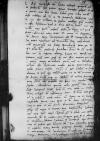Reverendissimo principi ac summo viro, domino ⌊Ioanni Dantisco⌋, episcopo Culmensi, oratori regio etc. domino perpetua fide colendo suo
Ad ⌊Campensis⌋ nostri litteras rescripsi quicquid ad te scribendum esse putavi, optime Dantisce, quamquam et ad te paucos ante dies litteras dederam, quas video nondum fuisse redditas tibi, cum tu et ⌊Campensis⌋ scriberetis. Spero tamen nunc esse redditas, ex quibus intelleges, quam invitus a vobis discesserim, quod tu dicis poetice factum, nec ego multum nego poetam vesanum fuisse me eo tempore. Sed quid facerem: abeundum utique erat, et mane, cum surgerem, nemo ferme tuorum surrexerat et ⌊Campensis⌋ iam suo more exierat ad ⌊Danubium⌋. Itaque vale dicere nulli praeterquam tuo fratri ⌊Bernhardo⌋ potui, qui et ipse adhuc tum profundo stertebat somno et non credebat me tam repente abiturum. Quare, mi carissime patrone, nihil erat quod de me esses anxius, qui etiam si peream, citra iacturam peream, nisi tu fortassis iacturam esse existimas malis poetis pereuntibus malos perire versus.
Nunc si post octiduum, ut scribis, abiturus es, quid ego redeam? Metuo ne te non inveniam et frustra veniam, neque enim ⌊caesarem⌋ et omnes principes tanti facio, ut propter eos ⌊hinc⌋ me moveam. Te sequar libentissime, quocumque voles gentium. De ecclesiaste ⌊Campensi⌋ scripsi; bonam iam eius partem in versus conieci, reliquum item absoluturus brevi, et omnino antequam ad te redeam, si modo redeam, nam super ea re tuas exspectabo litteras. Non spero te tam brevi abiturum. Scio enim, quam te non facile dimittat ⌊Augustus⌋ quamque non anxie te revocet tuus ⌊Sigismundus⌋. Salutes oro meo nomine carissimum ⌊Campensem⌋, quem et ⌊filiola mea⌋, ipsius uxorcula, item et ⌊mater mea Regina⌋, quae et te plurimum ac reverenter salutat. Salutant et ⌊Campensem⌋ duae familiae meae cum quibus ipse consuevit etc. Dominus ⌊Cornelius⌋ egregie me implevit
cf. Verg. A. I 215 ⌊veteris Bacchi pinguisque ferinaecf. Verg. A. I 215 ⌋. Salutat te reverenter noster ⌊Ioachimus⌋. Vale mi studiorum meorum maecenas.

